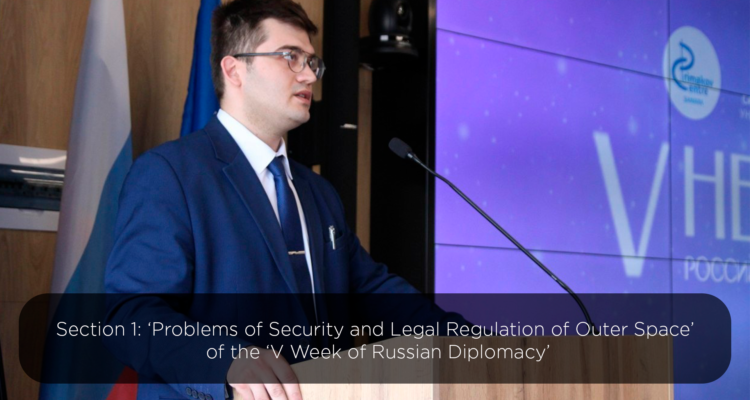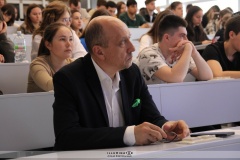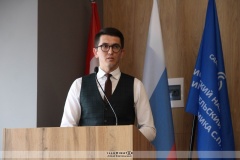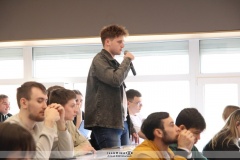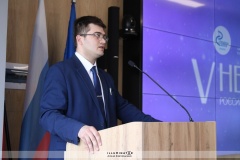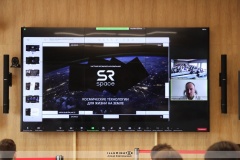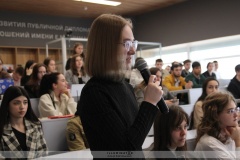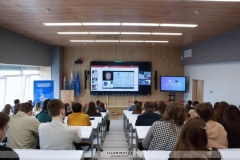The first section devoted to the problems of security and legal regulation of outer space was opened by the speech of Olga Selivanova, Head of the Archive Acquisition Department of the Russian Academy of Sciences. Olga Selivanova drew attention to the fact that the victories in space exploration are not only the victories of the Soviet and Russian sides, but also of the whole mankind:
“The Academy of Sciences recently celebrated its 300th anniversary. Science has always been international, even during the Iron Curtain.”
Mukhtar Mannanov, Head of the Marketing Department of JSC SRC Progress, made a report on modern aspects of international cooperation in space. As the speaker noted, the history of the development of international cooperation can be divided into several periods: rivalry, hidden space exploration and leadership.
Currently, several projects are being implemented: the Russian-European Soyuz project at the GCC, the Sirius project with modeling the conditions of a long-term manned stay, the EcoMard, OneWeb, Venera—D projects, showing that today’s conditions of commercial projects have lost commercial benefits, and scientific projects have almost completely disappeared today.
“Now Russia is cooperating with the BRICS countries in space, where every leader is honest and opened to partnerships. Space is not only an endless space, but also a huge potential for the development of mankind,”
Igor Kozhelin, General Director of SR Data (a subsidiary of SR Space , SR Data company is engaged in the creation of products for the domestic market, the CIS and BRICS countries, the supply of satellite images, exchange of experience) believes:
“Space brings huge social and economic development for any country, and the current sanctions have become a point of growth for the company and the entire space sector as a whole, since processes have been rebuilt and engineering and technology are actively developing now.”
Today in Russia there are so—called “next to S. Korolevs” – promising Russian specialists who create their own products. For example, small rockets — the NEBO geophysical rocket, the COSMOS ultralight and light class rocket launcher and the STALKER with its own production cycle.
Ivan Belyaev, an assistant at the Department of Theory and History of State and International Law at the Law Institute of Samara University, presented a report on topical issues of space law. Ivan Belyaev spoke in detail about the issues of jurisdiction in the field of space law and the rules for the application of quasi-territorial, passive-civil and real principles in relation to outer space.
As the speaker noted, international space law is at the very beginning of development, and it is important to take this into account when analyzing and developing regulatory measures, and space diplomacy is extremely important in this process.
According to the speaker, space diplomacy is formed on the basis of international customs.
“I would like Russia to be the first not only in space exploration, but also in the issue of jurisdiction of international law,”
Alexander Ulanov, Deputy Vice-Rector of MGIMO, Ministry of Foreign Affairs of Russia, presented a study of the segments of the space market. As the speaker noted, digitalization and technological development are currently affecting the space market.
Alexander Ulanov noted that Russia, the United States, China, France and India are now leaders in the space market, but there are countries in the East that also assert themselves very confidently and claim high positions. He noted the current trends in the development of the international space market, which consist in private investments, the growth of sustainable development and the popularity of small spacecraft, as well as the development of space tourism.
Nelson Avakian, Chairman of the MGIMO Space Diplomacy Club of the Russian Foreign Ministry , spoke about international cooperation in the field of space and the prospect of modern space diplomacy.
Photo: Ildar Popov , Alina Kavtaskina (Photo Club “Illuminator” named after V.A. Kakovkin)

